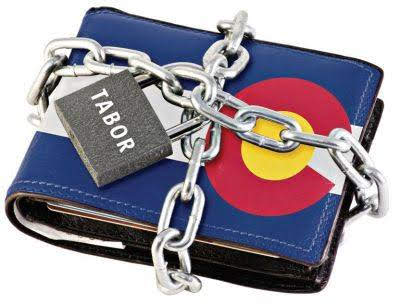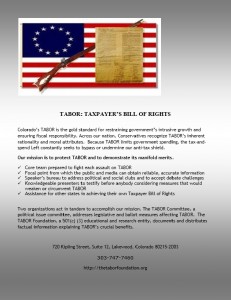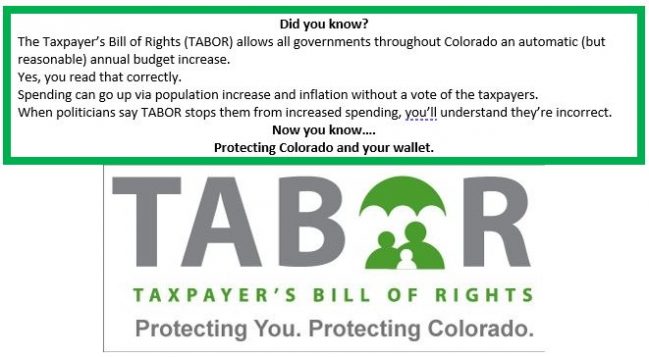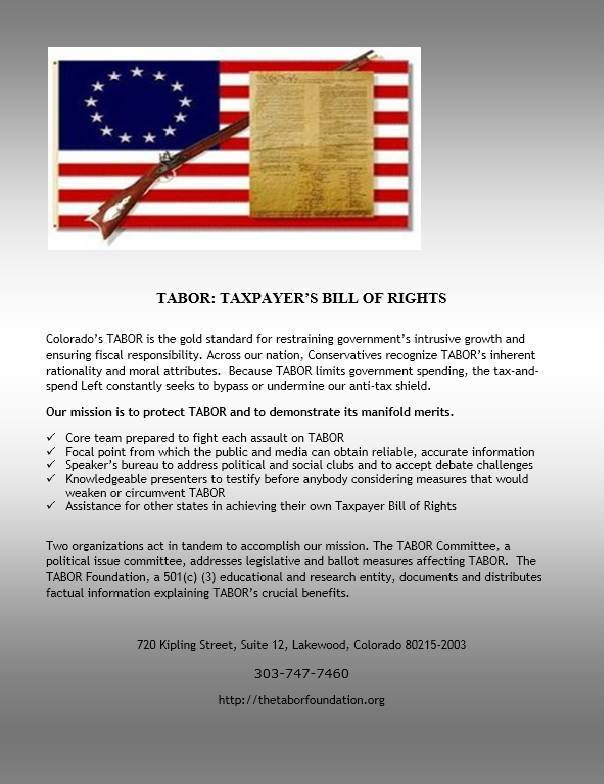#ItsYourMoneyNotTheirs
#ThankGodForTABOR
#VoteOnTaxesAndFees
#FeesAreTaxes
#TABOR
#FollowTheMoney
#FollowTheLaw

#ItsYourMoneyNotTheirs
#ThankGodForTABOR
#VoteOnTaxesAndFees
#FeesAreTaxes
#TABOR
#FollowTheMoney
#FollowTheLaw

By Natalie Menten
Guest Commentary
The state government has taken more taxes from you than we allow it to have, and it should rebate that over-collection back to you. That money coming back to all taxpayers is now in jeopardy. We should be alarmed at the potential waste.
Colorado voters’ dissatisfaction with government growing beyond its means led to the passage of the Taxpayer’s Bill of Rights (TABOR). This constitutional amendment requires voter approval for tax increases and debt. It also limits how fast government can grow. The formula for automatic tax increases is the prior year’s budget plus adjustment for inflation and population growth.
When government collects taxes above the limit, it must refund the surplus. Later this year, each taxpayer will get a $750 TABOR rebate from the state. The economic outlook predicts rebates for the next several years.
Two statewide ballot measures in November claim they don’t raise taxes, but that’s just not true. Funding for new programs comes from our future TABOR rebates. If we don’t get all those rebates back, that’s effectively a higher tax rate and clearly a tax hike.
Click the link below to continue reading this article at the Denver Post.
Opinion: Statewide affordable housing program will cut into your TABOR refunds
PAID FAMILY LEAVE
By Shelly Bradbury
The Denver Post
The Colorado Supreme Court next week will consider whether the state’s fledgling family and medical leave program violates the Taxpayer’s Bill of Rights amendment to the Colorado Constitution.
The legal challenge, to be argued on Tuesday, focuses on funding for the newly voter-approved program, which will, beginning in 2024, offer up to 12 weeks of paid time off to most Colorado workers who are either sick or caring for their newborns or seriously ill family members.
Also known as Proposition 118, the $1.2 billion program was approved in 2020 by voters in a 57% to 43% vote.
The state will begin funding the program in January 2023 by collecting between 0.45% and 0.9% of employees’ annual pay from employees and their employers, with some exceptions.
That premium could be increased to as much as 1.2% of wages after 2025.
Those premiums are at the center of the legal challenge by Chronos Builders, a Grand Junction homebuilding company, which argues the fees are surcharges on income that violate TABOR, which requires that all income “be taxed at one rate … with no added tax or surcharge.” Continue reading
Senate Bill 260, passed by Democrats in 2021, enacted new fees on gasoline purchases, deliveries and Uber and Lyft rides to raise billions for transportation projects

Colorado’s new transportation fees violate the Taxpayer’s Bill of Rights and several other state finance laws and should be invalidated, two conservative groups and Republican state Sen. Jerry Sonnenberg claim in a long-promised lawsuit filed late Thursday in Denver.
Senate Bill 260, passed by Democrats in the legislature last year, enacted a host of new transportation fees — including on gasoline purchases, deliveries and Uber and Lyft rides — to raise money for road and transit projects across the state.
 There was excellent news last month. It appears the Plaintiffs have decided not to move forward with the existential threat to TABOR, ending the Kerr vs. Polis lawsuit!
There was excellent news last month. It appears the Plaintiffs have decided not to move forward with the existential threat to TABOR, ending the Kerr vs. Polis lawsuit!
The TABOR Foundation has been coordinating a national coalition of 19 freedom organizations that were ready to submit a friend-of-the-court brief to the US Supreme Court. We won’t have to write it after all.
When the 10th Circuit Court of Appeals (sitting en banc) issued its ruling last December that was favorable to our position, you could have bet your bottom dollar that the Plaintiffs would continue the lawsuit. Many left-of-center people and organizations have been pushing this case for over a decade.
The next step in the process would have been for Plaintiffs to petition the Supreme Court for a writ of certiorari asking the Court to take up the case (for a second time). Such a petition had to have been filed by a March 14 deadline, but was not.
The Judgment dismissed the case for failing to state a claim upon which the Court could grant relief for the remaining Plaintiffs, who consisted of a few school districts and other political subdivisions of the State of Colorado. Originally the Plaintiffs also included individual legislators and citizens. The individual legislators had been denied standing to sue because they only alleged institutional injuries to the government and none to themselves as legislators. And the individual citizens did not even allege whether or how TABOR injured them personally.
With respect to the school districts and other political subdivisions, the Court ruled that the US Constitution does not provide political subdivisions with rights against their parent states. Moreover, none of the Plaintiffs identified any other law providing them with a claim for relief to challenge TABOR.
The Court of Appeal’s dismissal was “without prejudice,” so the Plaintiffs could try a new filing. We’ll keep watch just in case.
The heart of the Plaintiffs’ legal theory, that citizens are prohibited from placing restrictions on certain legislative powers, was extremely dangerous to the fundamental principles of limited government.
Friends of the Taxpayer’s Bill of Rights can breathe a sigh of relief and celebrate, for now.


Justices of the Colorado Supreme Court, 2021
The Colorado Supreme Court will decide whether the paid family and medical leave program that voters enacted in the 2020 election violates the state’s Taxpayer Bill of Rights.
The court announced on Monday that it will review a decision from Denver District Court that dismissed a lawsuit over Proposition 118, the Paid Family and Medical Leave Insurance Program. By a margin of 58% to 42%, voters approved a plan to impose payroll premiums, split between employers and employees, that would entitle workers to up to 12 weeks of paid leave.
Beginning on Jan. 1, 2023, payments into the program will begin. But Grand Junction-based Chronos Builders is claiming that the funding arrangement violates TABOR, the 1992 constitutional amendment that requires tax increases to be put to a vote of the electorate, among other restrictions.
“Any income tax law change,” TABOR reads, “shall also require all taxable net income to be taxed at one rate … with no added tax or surcharge.”
Click (HERE) to continue reading this story at ColoradoPolitics
The Denver-based 10th U.S. Circuit Court of Appeals has dismissed a lawsuit challenging Colorado’s strict constitutional tax and spending limits.
Colorado Politics reports that the court dismissed the lawsuit, filed in 2011 by a group of elected officials who argued that the voter-approved 1992 Taxpayer’s Bill of Rights violates the U.S. Constitution, which guarantees a republican form of government in each state where elected officials make decisions.
To continue reading the rest of this story, please click (HERE) to go to the Colorado Sun.

The TABOR Committee urges a YES vote on Proposition 120, “Property Tax Assessment Rate Reduction.”
The proposal would put into law the assessed values for residential and commercial property for purposes of calculating annual property taxes. It would lower the calculated tax burden by about $1 Billion.
The repeal of the Gallagher Amendment was argued as a way to simplify the tax system and make it more rational. It also resulted in higher expected property taxes. This proposal reduces the expected property taxes. After the measure qualified for the ballot, the legislature acted to thwart the will of the people by passing a bill which vastly reduced the effect. Voting for the measure will certainly lead to a necessary legal challenge, based on the standing legal theory that the most recent change in statute (the passage of the Proposition) becomes the new controlling law. Not only is this measure’s underlying tax reform a good idea, but the fall-out will be critical in preventing future legislators from denying the people the right of the initiative through dishonest subterfuge.
#ItsYourMoneyNotTheirs
#ThankGodForTABOR
#VoteOnTaxesAndFees
#TABOR
#FollowTheMoney
#FollowTheLaw
#UnlessLiberalsIgnoreTheLaw

The TABOR Committee urges a NO vote on Proposition 119, “Learning Enrichment and Academic Progress Program.”
The initiated measure would change state law to increase taxes by $137.6 Million on marijuana. Proceeds would go to a new program and agency to fund K-12 after-school activities.
That this concept includes voucher-like opportunities is a good, but insufficient reason to support the measure. Yet another new centralized state government program is unlikely to solve the problems, will have a significant administrative burden and necessarily get bogged down in red tape, funding too much bureaucracy and too little programming. Additionally, ever-higher taxes on marijuana will encourage the lower-cost, criminal underground market for pot.
#ItsYourMoneyNotTheirs
#ThankGodForTABOR
#VoteOnTaxesAndFees
#TABOR
#FollowTheMoney
#FollowTheLaw
#UnlessLiberalsIgnoreTheLaw
